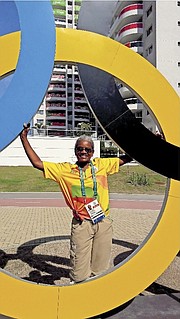By BRENT STUBBS
Senior Sports Reporter
bstubbs@tribunemedia.net
RIO de Janeiro, Brazil — She has been a long time advocate for anti-doping in the Bahamas. So it was no surprise to see Dr Pattie Symonette helping out in some capacity at the 2016 Olymic Games.
Symonette, a former member and now a consultant for the Bahamas Anti Doping Commission, was one of four persons among a list of 80 around the world who participated in the World Anti Doping Organisation (WADO) that administered all of the doping of athletes during the games.
“I did the Pan American Games in Toronto last year and I got the exposure to the organisers from PASO (Pan American Sports Organiation) and got an invitation to come to Rio to assist,” Symonette said.
While in Rio, Symonette said they spent time testing athletes randomly at the Olympic Village where the athletes stayed and at all of the venues in which they competed in.
“There was more testing done on athletes this year than ever before,” said Symonette, who was not at liberty to say who and if any Bahamians were tested, or exactly who from the rest of the world were tested.
What she did say was they ran into a serious problem with some of the athletes because when they needed to test them, they didn’t have a chaperone present. “That was what really put a strain on anti-doping at this Olympics,” she stated. “We needed the chaperones in order to test the athletes, although they were grown men and women in some instances.”
If there was any lesson that Symonette would have learnt and will be eager to share with the Bahamian public once she returns home on Monday through the various seminars and clinics she conducts on a regular basis is the fact that more Bahamians can get the same type of exposure that she received if they are willing to apply themselves as volunteers for these prestigious sporting events.
“There were chaperones from all over the world who were there helping out,” she said. “It’s not just limited to people from Brazil. I know of one guy who came from the United States, but he was willing to stay in a hotel because he said he wanted to get the experience.”
Additionally, Symonette said the BADC and the Bahamas Association of Athletic Associations as well as the Bahamas Olympic Committee need to do a better job of collaborating so that they can properly sensitise the Bahamian athletes to the procedures that they have to go through with anti-doping.
“The outreach is very difficult in terms of reaching out to the athletes,” Symonette said. “In most cases, the coaches aren’t advising the athletes about the importance of anti-doping and being a part of a clean sport.
“The further you go up in your career, the more you will be tested. I’m sure athletes like Shaunae Miller, even before she got the medal, and Chris Brown, can tell you that they are often tested more than they could imagine.
Symonette said that comes with the territory because athletes are often tested several times out of competition and even when they are competing, they are tested again.
In the meantime, Symonette said she was just happy to be the only Bahamian who got the opportunity to participate in such an important aspect of the games and she’s looking forward to continuing to make her appearances in other major international events, even if it has to be as a volunteer again.
“Several of the delegates there were from Japan because as you know the next Olympics will be in Tokyo, so I got an opportunity to share and work with about two of them and they have already given me an invitation to come to Tokyo,” she said.
In her role as a facilitator, Symonette said she had the opportunity to share the “Best Practices” concept with the BADC and she is willing to work with the federations because it’s important that the elite athletes know the importance of the concept.
“This is a part of the requirements as athletes,” said Symonette. “So they have to know what to expect when they go abroad to compete and it doesn’t come as a surprise to them when they are randomly selected to be tested, either before they compete or just after they have competed.”




Comments
Use the comment form below to begin a discussion about this content.
Sign in to comment
Or login with:
OpenID